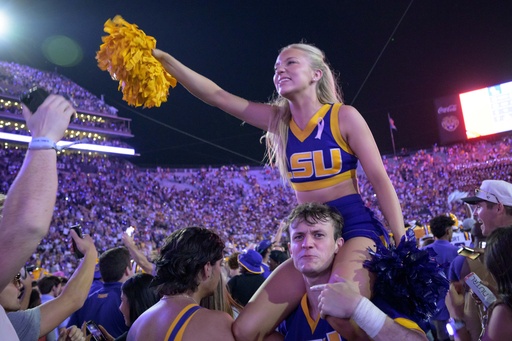
If the 16th-ranked LSU Tigers manage to secure a victory against the 14th-ranked Alabama Crimson Tide in an upcoming game on November 9th, fans could once again rush the field. This action could lead to significant financial repercussions for LSU’s athletic program, potentially costing them as much as $500,000 to be paid to Alabama.
This intense rivalry match could be the latest example of a Southeastern Conference (SEC) regulation concerning field invasions that was recently updated prior to this football season. The primary aim of the revised policy was to deter fans from encroaching onto the field. Despite these efforts, instances of field rushing have continued, such as when LSU faced Mississippi on October 12 and had to fork out $250,000 in fines after an overtime victory. Should the Tigers storm the field once more against Alabama, their fines for this season alone could reach a staggering $750,000.
In light of these financial implications, LSU’s head coach, Brian Kelly, has expressed more concern for the safety of players rather than the fines themselves. He noted that even in today’s environment, where schools are increasingly investing in their student-athletes, the penalties may still not exert a considerable impact.
“Ultimately, those fines will likely be absorbed by the administration, and I doubt they will influence NIL (Name, Image, Likeness) opportunities significantly” Kelly mentioned. He added that consistent winning and exciting performances could in fact enhance a team’s NIL profile, ultimately benefiting the program.
Since joining LSU in 2022, Kelly has experienced a total of three fan invasions at home and two during away games. He supports the current penalty framework as it is designed to make schools take action against such occurrences. “The fines are meant to be felt by the program,” Kelly stated. “It’s our responsibility to ensure increased security measures to prevent hazardous situations from occurring.”
The fines, which encompass both football and basketball events, reset annually on January 1. Initial offenses incur a penalty of $100,000, escalating to $250,000 for a second offense, and reaching a maximum of $500,000 for third-time violations or more. Earlier this year, LSU received a $100,000 penalty after fans invaded the court following a men’s basketball victory over Kentucky. Thus, the recent $250,000 fine following the Ole Miss game fell within the established guidelines. Conversely, Mississippi was also subject to a $100,000 fine in light of their loss to LSU in Oxford this season.
In contrast, Alabama has seen fans rush the field after recent defeats to teams like Vanderbilt and Tennessee, similarly racking up penalties of $100,000 from both programs. Meanwhile, Tennessee is currently financially better off as it received $250,000 from Arkansas after facing defeat on the road. Although the field invasions persist, SEC officials believe member schools have been proactive in safeguarding their environments when these situations unfold.
SEC Associate Commissioner Herb Vincent remarked on the recent initiatives undertaken by schools, noting an enhanced focus on team safety during these chaotic moments. He observed efforts made during the Ole Miss game, where security effectively managed the crowd as jubilant fans rushed the field after the last-minute touchdown, allowing team personnel to exit with minimal interference.
Alabama’s first-year head coach Kalen DeBoer expressed satisfaction over the lack of serious incidents affecting his players during these games. “It only takes one overly enthusiastic fan to create a potentially harmful situation,” DeBoer warned. “Our players have conducted themselves admirably in those high-stress scenarios.”
While Ole Miss’s Lane Kiffin expressed concerns that the current field invasion policies fell short of their objectives, Vanderbilt’s coach Clark Lea took a different stance. He believes the fines act as a deterrent but insists that safety should always take precedence during games.
“There is no room for fans to encroach onto the field as it compromises the safety of the opposing team,” Lea emphasized, acknowledging the chaotic nature of such moments. Yet he reflected fondly on Vanderbilt’s shocking victory over Alabama, despite the subsequent field rush that involved fans celebrating by removing goalposts and parading them through Nashville. “That was an extraordinary moment for our community, and I cherish it deeply,” he concluded. “But I also desire to progress beyond that and aim for consistent excellence in our performances.”
